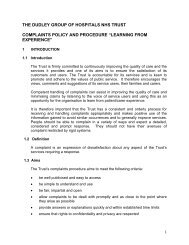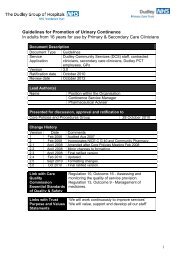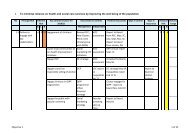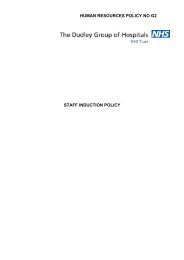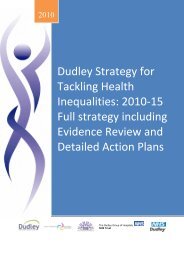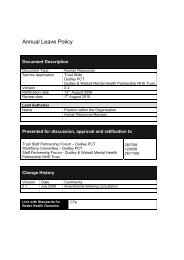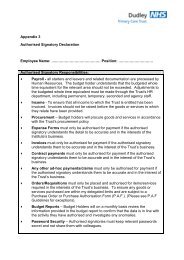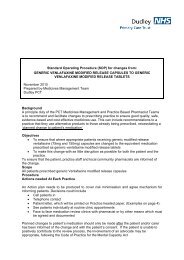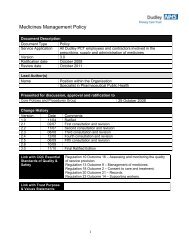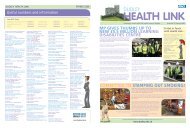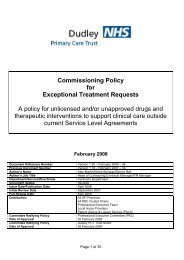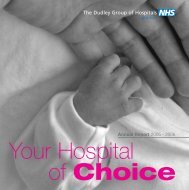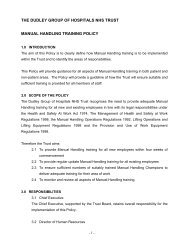Chronic Kidney Disease Pathway Document Description Presented ...
Chronic Kidney Disease Pathway Document Description Presented ...
Chronic Kidney Disease Pathway Document Description Presented ...
You also want an ePaper? Increase the reach of your titles
YUMPU automatically turns print PDFs into web optimized ePapers that Google loves.
Introduction<br />
<strong>Chronic</strong> kidney disease (CKD) describes abnormal kidney function and/or<br />
structure. It is common, frequently unrecognised and often exists together with<br />
other conditions (for example, cardiovascular disease and diabetes). When<br />
advanced, it also carries a higher risk of mortality. The risk of developing CKD<br />
increases with increasing age, and some conditions that coexist with CKD<br />
become more severe as kidney dysfunction advances. CKD can progress to<br />
established renal failure in a small but significant percentage of people.<br />
CKD is usually asymptomatic, but it is detectable, and tests for detecting CKD<br />
are both simple and freely available. There is evidence that treatment can<br />
prevent or delay the progression of CKD, reduce or prevent the development of<br />
complications and reduce the risk of cardiovascular disease. However, because<br />
of a lack of specific symptoms, people with CKD are often not diagnosed, or<br />
diagnosed late when CKD is at an advanced stage.<br />
http://www.nice.org.uk/nicemedia/pdf/CG073NICEGuideline.pdf<br />
Normal <strong>Kidney</strong> Ageing<br />
A normal estimated glomerular filtration rate (eGFR) is about 100 ml/min in young<br />
adults. However, this may be somewhat lower, some young adults with normal<br />
kidneys may have an eGFR as low as 75 ml/min. Normal kidney function<br />
deteriorates with age and falls by about 1 ml/min per year. Therefore as people<br />
get older, many healthy people aged 75+ may have an eGFR of < 60 ml/min.<br />
Recent research suggests that 1 in 10 of the population may have chronic kidney<br />
disease (CKD), but it is less common in young adults, being present in 1 in 50<br />
people. In those aged over 75 years, CKD is present in 1 out of 2 people.<br />
However, many elderly people with an eGFR < 60 mls/min may not have<br />
‘diseased’ kidneys, but have normal ageing of their kidneys. Although severe<br />
kidney failure will not occur with normal ageing of the kidneys, there is an<br />
increased chance of high blood pressure and heart disease or stroke.<br />
It is recommended that all patients with CKD stage 1 – 5, including elderly<br />
patients are added to the CKD register for the GMS Contract Quality and<br />
Outcomes Framework and undergo annual screening to monitor the rate of<br />
progression, blood pressure, proteinuria and development of associated<br />
cardiovascular risk factors.<br />
http://www.kidney.org.uk/Medical-Info/ckd-info/index.html<br />
Late referral of patients with CKD requiring renal replacement therapy (RRT) to<br />
specialist renal services is associated with significant cost and poor clinical<br />
outcomes. On average 30% of people with advanced kidney disease are<br />
referred late to nephrology services from both primary and secondary care,<br />
causing increased mortality and morbidity.<br />
http://www.nice.org.uk/nicemedia/pdf/CG073NICEGuideline.pdf<br />
7



